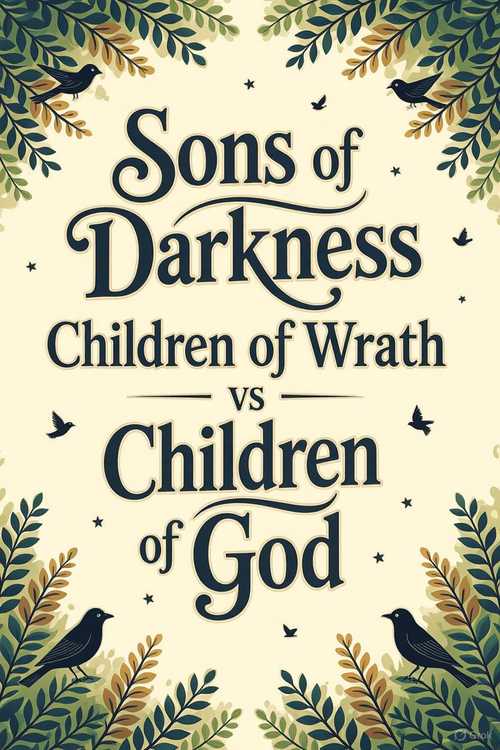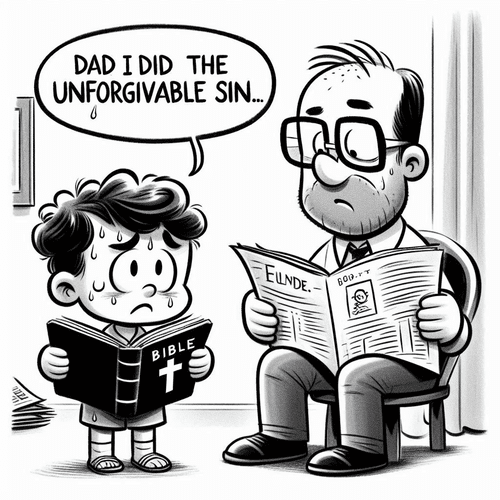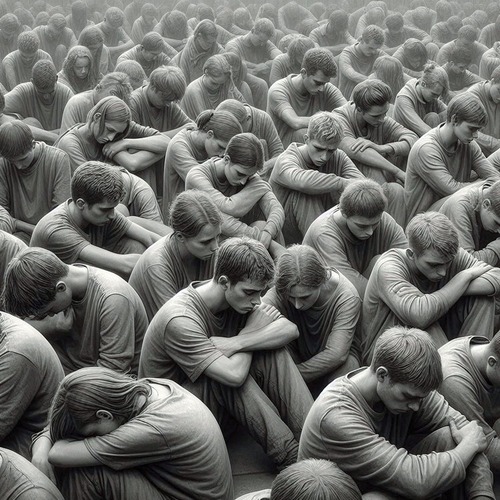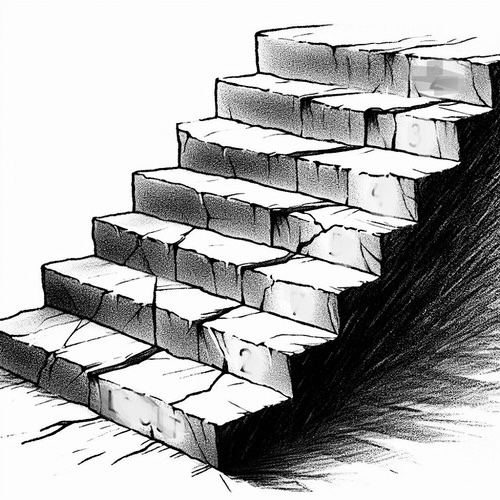Who Are the ‘Sons of Disobedience’? Ephesians 2:2 Explained
Every human being falls into one of two spiritual categories according to Scripture. Paul’s letter to the Ephesians draws this stark dividing line when he describes unbelievers as “sons of disobedience” (Ephesians 2:2). This isn’t mere religious rhetoric—it’s a precise theological diagnosis that throws light on both human nature and the gospel itself.
MORE THAN REBELLIOUS BEHAVIOUR
The phrase “sons of disobedience” reveals something profound about unregenerate humanity. The Greek word huios (sons) indicates intimate relationship and shared nature, not merely behaviour patterns. When Scripture calls someone a “son” of something, it describes their essential identity and character.
The word apeitheia (disobedience) means active, willful rejection of God’s authority—not passive ignorance or well-intentioned mistakes. This isn’t describing people who occasionally disobey God; it’s identifying those whose fundamental orientation is rebellion against their Creator.
Paul uses parallel language throughout his epistles. In Ephesians 5:6, he warns “the wrath of God comes upon the sons of disobedience.” Colossians 3:6 echoes this same judgement. John 3:36 provides the clearest explanation: “Whoever does not obey the Son shall not see life, but the wrath of God remains on him.”
Notice Paul includes all of humanity in this category before conversion: “we all once lived in the passions of our flesh…and were by nature children of wrath” (Ephesians 2:3). This isn’t describing a subset of particularly wicked people—it’s the universal human condition apart from Christ.
THE ANATOMY OF SPIRITUAL REBELLION
What characterises these “sons of disobedience”? Ephesians 2:1-3 provides a comprehensive portrait. They’re spiritually dead, following “the course of this world” and living under Satan’s influence as “the prince of the power of the air.” Their lives are driven by “the desires of the flesh and of the mind.”
This spiritual death manifests in predictable ways. Romans 1:18-32 describes how humanity “suppresses the truth in unrighteousness,” exchanging God’s glory for created things. Romans 8:7 states bluntly “the mind that is set on the flesh is hostile to God; it does not submit to God’s law, indeed it cannot.”
The natural person cannot understand spiritual things (1 Corinthians 2:14). This isn’t intellectual limitation—it’s moral inability rooted in rebellion. The “sons of disobedience” may be brilliant philosophers, moral citizens—even religious leaders—yet they remain fundamentally opposed to God’s authority over their lives.
This rebellion takes various forms: outright moral defiance, intellectual pride that rejects divine revelation, religious self-righteousness that seeks to earn God’s favour, or simple indifference toward Christ. Yet all these manifestations flow from the same root—the creature’s rejection of the Creator’s rightful rule.
Perhaps most tragically, those enslaved to sin believe themselves free (John 8:34). They may live exemplary lives by human standards while remaining “sons of disobedience” in God’s sight. External morality cannot change internal rebellion against divine authority.
GOD’S JUSTICE, NOT MEANNESS
God’s response to this rebellion isn’t arbitrary anger but perfect justice. The “wrath of God” mentioned in Ephesians 5:6 represents His righteous judgment against sin. This wrath is both a present reality (John 3:36—“remains on him”) and a future certainty.
Romans 1 describes how God presently gives rebels over to their chosen path, allowing them to experience the natural consequences of rejecting Him. Romans 2:5 warns of those who “store up wrath” for the day of judgment through continued hard-heartedness.
This divine response vindicates God’s holiness and upholds His moral law. Sin against an infinitely holy God deserves infinite punishment. Far from being excessive, God’s wrath against the “sons of disobedience” demonstrates His perfect justice and the seriousness of rebellion against Him.
THE GREAT REVERSAL
Yet Ephesians 2 doesn’t end with condemnation. Verse 4 contains one of Scripture’s most beautiful phrases: “But God, being rich in mercy, because of the great love with which he loved us, even when we were dead in our trespasses, made us alive together with Christ.”
This transformation from “son of disobedience” to “child of God” (1 John 3:1) isn’t human achievement—it’s divine miracle. God makes spiritually dead rebels alive, transferring them “from the domain of darkness” to “the kingdom of his beloved Son” (Colossians 1:13).
The evidence of this change is unmistakable. True converts “cannot keep on sinning” because they’re “born of God” (1 John 3:9). They become “obedient from the heart” (Romans 6:17) and are “created in Christ Jesus for good works” (Ephesians 2:10).
THE GOSPEL’S URGENCY
Understanding the “sons of disobedience” reveals why the gospel is so urgent. Every person begins life in this category—dead in sin, under divine wrath, enslaved to rebellion against God. No amount of moral improvement, religious activity, or philosophical sophistication can change this fundamental condition.
Only through union with Christ can anyone escape being a “son of disobedience.” This transformation requires complete dependence on divine grace, not human effort or decision.
This truth should drive us to urgent evangelism and humble gratitude. We were once “sons of disobedience”—but God, rich in mercy, made us alive in Christ.
SONS OF DISOBEDIENCE: RELATED FAQs
Are “sons of disobedience” the same as “children of wrath” in Ephesians 2:3? Yes, these are overlapping descriptions of the same spiritual condition. “Sons of disobedience” emphasises humanity’s active rebellion against God’s authority, while “children of wrath” focuses on their standing under divine judgement. Theologians like John Calvin noted that Paul uses different metaphors to paint a complete picture of human depravity. Both phrases describe the same unregenerate state from different angles—one highlighting the cause (disobedience) and the other the consequence (wrath).
- Does this phrase apply to infants and young children who cannot yet disobey? Reformed scholars have historically held that original sin affects all humanity from conception, including infants. Theologians like Charles Hodge argued “sons of disobedience” describes nature, not just actions—infants inherit Adam’s corrupt nature even before committing personal sins. However, many Reformed theologians also affirm God extends special grace to infants who die, as David implied about his deceased child (2 Samuel 12:23). The phrase describes our condition in Adam, but God’s electing grace can cover those unable to exercise faith.
- How do Arminian theologians interpret this phrase differently? Arminian scholars typically emphasise human free will and resistible grace, arguing people become “sons of disobedience” through their own choices rather than inheriting this nature. They often interpret the phrase as describing those who’ve rejected prevenient grace available to all. However, this view struggles with Paul’s assertion that “we all once lived” this way (Ephesians 2:3) and his emphasis on being “dead in trespasses” before any conscious choice. The Reformed position better explains why divine regeneration, not human decision, must precede faith.
Can I be a “partial” son of disobedience—sometimes obedient, sometimes not? Scripture presents no middle category between spiritual life and death. Reformed theologians emphasise “sons of disobedience” describes fundamental nature, not behavioural consistency. Even moral, religious people remain in this category until regeneration, as their “obedience” stems from self-interest rather than love for God (Romans 8:7-8). Jesus declared that we cannot serve two masters (Matthew 6:24), and Paul describes the unregenerate as unable to please God (Romans 8:8). External compliance doesn’t change internal rebellion against divine authority.
- Why do some translations say “sons of disobedience” while others say “disobedient people”? Modern translations often prefer dynamic equivalence (“disobedient people”) to communicate meaning, while formal equivalence translations maintain “sons of disobedience” to preserve the original Greek structure. Reformed scholars prefer the literal rendering because huios (sons) carries theological weight—it indicates shared nature and family identity, not merely behaviour. The phrase “sons of X” appears throughout Scripture to denote essential character (e.g., “sons of thunder,” “sons of light”). Losing this familial language diminishes Paul’s point about fundamental spiritual identity.
- How does this relate to the “unpardonable sin” mentioned elsewhere in Scripture? The unpardonable sin (blasphemy against the Holy Spirit) represents the ultimate expression of being a “son of disobedience”—persistent, willful rejection of God’s Spirit despite clear evidence of His work. Reformed theologians like John Owen argued this sin is unforgivable not because God lacks mercy, but because it hardens the heart beyond the possibility of repentance. Those who commit this sin remain permanently in the “sons of disobedience” category because they’ve rejected the only means of escape. However, anyone concerned about committing this sin likely hasn’t committed it, as it involves complete, defiant hardness.
Do Roman Catholic and Eastern Orthodox theologians interpret this phrase differently? Catholic theology acknowledges original sin but maintains that baptism removes the guilt while leaving concupiscence (tendency toward sin). They might argue baptised individuals are no longer “sons of disobedience” in the same sense, even if they later sin. Eastern Orthodox theology emphasises humanity’s wounded nature rather than total depravity, viewing “sons of disobedience” as describing those who haven’t received theosis (deification) through sacramental grace. However, the Reformed position better accounts for Paul’s stark either/or categories and his emphasis on the Spirit’s regenerating work rather than sacramental grace as the decisive factor in spiritual transformation.
SONS OF DISOBEDIENCE: OUR RELATED POSTS
Editor's Pick

‘Sell Everything You Have…’: Are We To Do So Literally?
When Jesus encountered the rich young ruler in Matthew 19:21, His words cut through with startling clarity: “If you want [...]

Why Jesus Said ‘It’s Better I Go Away’…
THE SUPERIOR GIFT OF THE HOLY SPIRIT “Nevertheless, I tell you the truth: it is to your advantage that I [...]

What About Those Who’ve Never Heard the Gospel?…
WILL GOD SHOW THEM MERCY ON JUDGEMENT DAY? Few questions tug at the Christian’s heart like this one. Picture the [...]

Cities of Refuge: Foreshadowing Our Safe Haven in Jesus
Picture this: A man is chopping wood with his neighbour when the axe head flies off the handle, striking and [...]

Testament to Design: The Engineering Marvel of Elephants
Picture an African elephant delicately plucking a single acacia leaf with the tip of its trunk, then moments later using [...]

Blue Whales: Mammoth Icons of Intelligent Design
Imagine an animal so massive its heart alone weighs as much as a small car, yet so precisely engineered it [...]

Do Unbelieving Kids Disqualify Church Leaders?
REFORMED PERSPECTIVES ON 1 TIMOTHY 3 AND ELDER QUALIFICATIONS Every pastor knows the heartbreak. A faithful elder who has served [...]
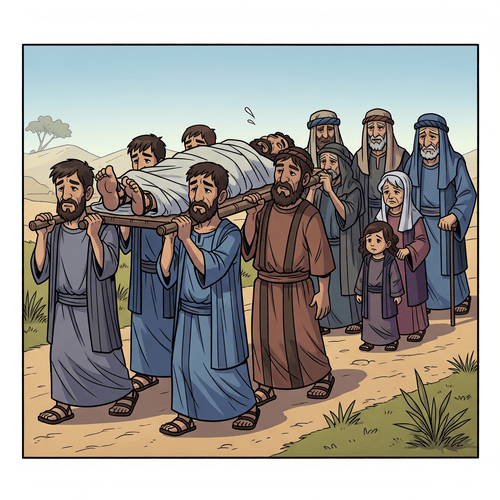
Why Did God Kill Onan? Wasn’t the Punishment Disproportionate?
The story of Onan in Genesis 38 troubles many. Why would God strike down a man for what seems like [...]

Is God Preparing Me for Ministry? How May I Know for Sure?
The question haunts many faithful believers. You’re serving faithfully in your local church, perhaps teaching Sunday school or leading a [...]
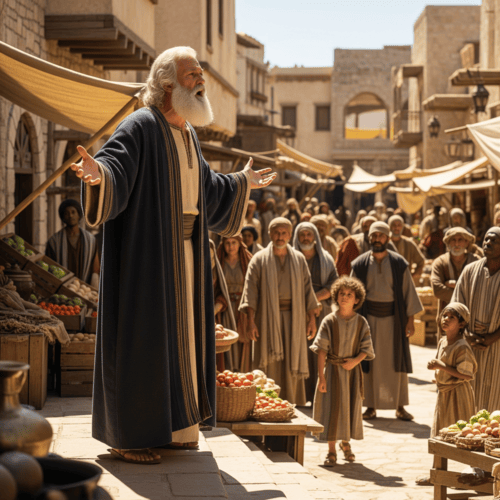
Ephesians 1:13: Was the Spirit’s Indwelling Promised of Old?
When Paul declares believers are “sealed with the promised Holy Spirit” in Ephesians 1:13, one word jumps off the page: [...]
SUPPORT US:
Feel the Holy Spirit's gentle nudge to partner with us?
Donate Online:
Account Name: TRUTHS TO DIE FOR FOUNDATION
Account Number: 10243565459
Bank IFSC: IDFB0043391
Bank Name: IDFC FIRST BANK


